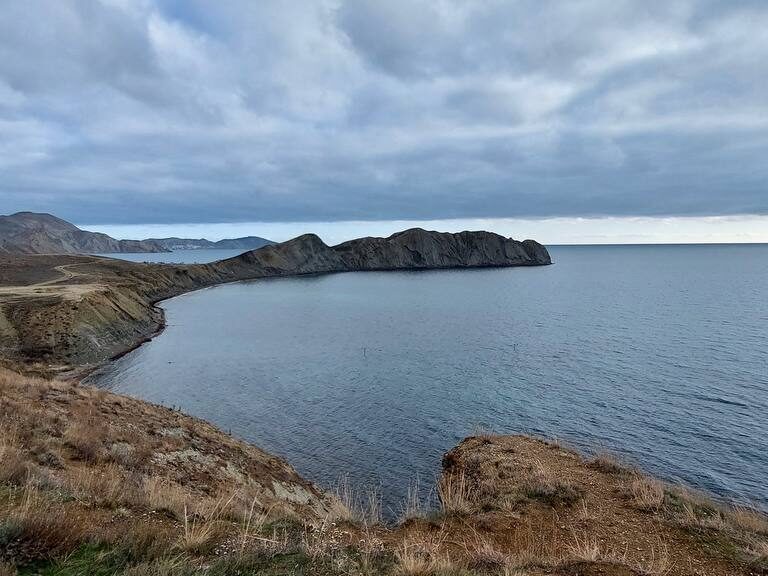Professor Borys Babin, Ph.D. Eduard Pleshko, Ph.D. Lynnyk Tetiana, Ph.D. Andrii Chvaliuk, Ph.D. Olexiy Plotnikov, PhD. Vyktor Filatov.
As our Association has already written, on April 4, the Cabinet of Ministers of Ukraine updated the Action Plan for the Implementation of the Strategy for the De-Occupation and Reintegration of the Autonomous Republic of Crimea and Sevastopol.
The Ukrainian government amended the Action Plan, previously adopted by government decree No. 1171-r dated September 29, 2021, developed by the Ministry of Reintegration of Ukraine, taking into account the conditions of martial law and the fact that the liberation of the peninsula may occur in the near future; in total, the plan includes 127 updated activities.
The improved Plan for the reintegration and de-occupation of the peninsula in accordance with the government order of April 4, 2023 No. 288-r concerns the protection of the rights of citizens of Ukraine and legal entities violated by the aggressor, social and humanitarian policy, international cooperation, economic policy, defense and security components, and so on.
The international dimension of the new edition of the Plan was studied by a group of experts from our Association.
A general analysis of the activities of the Plan shows that, in general, 41 out of 127 have an international dimension, either completely or in large part.
They are grouped in a separate section “International cooperation”, containing 14 events, and are contained in other sections of the plan, namely “Peculiarities of the state policy to ensure the de-occupation of the territory of the AR of Crimea and the city of Sevastopol” and “Environmental policy” (one event each out of 10 and 5 proposed respectively), “Legal protection of citizens of Ukraine and legal entities of Ukraine, whose rights and legitimate interests have been violated as a result of the armed aggression of Russia and temporary occupation of the territory of Ukraine” (3 events out of 24 proposed), “Social and humanitarian policy” (3 events out of 23 proposed), “Information policy” (5 events out of 19 proposed), “Protection of human rights and freedoms” (6 events out of 14 proposed) and “Economic policy” (7 events out of 12 proposed).
Such statistics indicate the priority areas in which, according to the position of the Ukrainian authorities, international support is needed in measuring the de-occupation and reintegration of the Crimea; in addition to international cooperation proper, these are economic, human rights and information spheres.
Also, out of the indicated measures of the plan that have an international dimension, the absolute majority, namely 34, assume their implementation “until the de-occupation of the temporarily occupied territory”, that is, within the framework of the de-occupation, and not the reintegration of the Crimea. Four more activities have a specific implementation period in 2023-2024, and three more should be carried out after the de-occupation of the temporarily occupied territory (TOT).
Thus, the Cabinet of Ministers of Ukraine focused on activities that should be implemented during the period of temporary occupation of the peninsula, and at the same time during this period such activities should be permanent, not staged.
At the same time, three of these activities should be implemented by the end of 2023.
This is the determination and confirmation by authorized state authorities, with the involvement of international audit companies, experts, and with 6 ministries as executors, of the damage caused, taking into account information from the Ukraine’s State Register of property damaged and destroyed as a result of hostilities, terrorist acts, sabotage caused by military aggression of Russia, the result of which should be an assessment of losses by authorized bodies together with international audit companies, experts (paragraph 47 of the plan).
It is also the start and further holding of the annual Forum on the Security of the Azov-Black Sea and Mediterranean Regions as the main event of the Crimean Platform in the field of security, including the protection of freedom of navigation, with three ministries as co-executors, with the development of initiatives and joint activities (paragraph 102 of the plan).
It is also a record of aviation activities that have violated the rules for using the airspace of Ukraine or illegally used the objects of aviation activities of Ukraine, in particular at the TOT, initiating bans on the activities of such entities on the territory of other states within the framework of international cooperation in the field of aviation and ensuring aviation security, in particular in within the framework of Ukraine’s cooperation with ICAO, with three co-executors from the authorities of Ukraine (paragraph 112 of the plan).
In addition, by the end of 2024, paragraph 36 of the plan provides, with 5 co-executors, a legal settlement of the issue of implementing the provisions of international humanitarian law in national criminal law in the context of overcoming the consequences of an international armed conflict, in particular, the ratification of the Rome Statute of the International Criminal Court (ICC) changes in the Criminal and Criminal Procedure Codes of Ukraine.
In fact, these activities of the plan provide, regardless of the situation of occupation or de-occupation, as of the relevant dates, and concrete results, including Ukraine’s ratification of the Rome Statute. Thus, the state of implementation of these measures on the relevant dates, as obligations of the Government of Ukraine, can become the subject of not only public control and evaluation, but also, accordingly, the object of legal response, including procedural.
Such possibilities of claims from interested structures affected by the occupation of Crimea in national lawsuits, in particular in the situation of inaction of certain authorities within the ongoing situation of the occupation of the Crimea, have been repeatedly confirmed in the decisions of the administrative courts of Ukraine.
In this context, one can point to the position of the Ukraine’s Supreme Court in the judgement of April 13, 2023 in case 420/8381/20 on the inaction of the State Fishery Agency of Ukraine on the issues of the interdepartmental agreement with Russia on fishing in the Sea of Azov, and, accordingly, the judgement of the Ukraine’s Fifth Administrative Court of Appeal of May 12 2021 in case 420/3863/20.
At the same time, the Ukrainian court in these cases emphasizes that the relevant requirements for the authorities of Ukraine in measuring the response to the occupation of the Crimea can be put forward by persons who have suffered both from the occupation itself and from the failure to take specific actions to de-occupy certain state bodies within their powers.
In this dimension, in particular, it is important to establish which specific authority, according to the Plan, was determined as the main, responsible executor of its specific activity, especially if there are a number of co-executors.
The three activities that the plan envisages after the de-occupation of the Crimea, as part of its reintegration, deal with rather separate issues.
This is, first of all, the initiation by Ukraine of joint interstate projects and programs with other states of the Black Sea region, which would include a joint inspection of the pollution of the Black Sea due to the militarization of the TOT and the Azov-Black Sea region by the aggressor state, as well as due to the illegal implementation by Russia infrastructure projects at the TOT that caused damage to the environment, with 7 specified co-executors (clause 77 of the plan).
Also, this is the organization of an IAEA inspection at the facilities of the Sevastopol National University of Nuclear Energy and Industry to restore the IAEA guarantees for TOT with two co-executors (paragraph 114 of the plan), as well as the creation in the Crimea after de-occupation, in cooperation with international and public organizations, specialized services support for victims of domestic violence and gender-based violence, with two co-executors (paragraph 122 of the plan).
Regarding the measures that should be taken under the conditions of the occupation of Crimea, it should first of all be noted that their implementation should undoubtedly be adjusted in accordance with the instructions of the Strategy for the De-occupation and Reintegration of the TOT of the AR of Crimea and the city of Sevastopol itself, approved by the decision of the National Security and Defense Council of Ukraine dated March 11, 2021 year and adopted by the Decree of the President of Ukraine dated March 24, 2021 No. 117/2021.
At the same time, the Strategy itself, unlike the Plan, has not yet been changed and the corresponding development of the project, according to a number of statements by authorized officials published in the spring of 2023, is still ongoing, under these conditions, additional adjustments to the plan’s activities should be expected, at least in terms of their terms of implementation and executors, after the approval by the President of Ukraine of the relevant changes to the Strategy.
Also, the results of the implementation of the plan’s measures, which have an international dimension and are expected to be achieved before the de-occupation of Crimea, can be divided according to the degree of their specification.
The most generalized and sometimes repeated results for different activities of the plan include the following:
- ensuring monitoring of the observance of the rights and legitimate interests of persons in the TOT, bringing to justice in accordance with the norms of international law those guilty of violating them;
- legal protection of persons whose rights and legitimate interests have been violated as a result of the armed aggression of Russia and the temporary occupation of the territory of Ukraine;
- activation and strengthening of coordination of international efforts for the de-occupation of the Crimea;
- deepening interstate cooperation on issues of de-occupation and reintegration of the TOT;
- compliance with obligations under all regimes in accordance with the national interests of Ukraine and the goals of non-proliferation of weapons of mass destruction, their means of delivery, limiting the transfer of conventional weapons and countering terrorism, in particular to the TOT;
- maintaining the relevance of the Crimean issue on the world agenda, obtaining the support of international partners in restoring the territorial integrity of Ukraine, condemning by the world community the illegal actions of Russia to occupy the territory of Crimea;
- consolidation of the international policy of non-recognition of the attempted annexation of the territory of the Crimea by Russia;
- presentation of Ukraine’s position on the situation at the TOT in the international arena;
- communication with the public of other states and the formation of pro-Ukrainian public opinion of the population of other countries regarding TOT;
- implementation of science-based informing international partners about the situation at the TOT;
- taking into account in the documents of international organizations the problem of violations of human rights in the TOT and the inclusion in them of appropriate signals to the address of the aggressor state;
- ensuring cooperation with the ICC in investigating the situation in Ukraine;
- continuation of existing and application of new international sanctions, separately – for structures in the field of illegal mining;
- preservation of the Ukrainian cultural heritage at the TOT;
- identify cases of disinformation of the international community about the state of affairs in the TOT and improve the ability to counter disinformation at the international and national level;
- increased political and diplomatic pressure on Russia, in particular on its occupying “administration” bodies responsible for the persecution of Ukrainian citizens in the TOT;
- ensuring coordinated with international partners counteraction to the militarization of the TOT, freedom of navigation in the Black and Azov Seas;
- realization of the abilities of the Mejlis of the Crimean Tatar People in the struggle for the rights of the Crimean Tatar people as the indigenous people of Ukraine.
The results of the international legal nature, which are more specific in the activities of the plan, include the following; - entering into the Unified Register of Pre-trial Investigations 100% of information about the criminal offenses committed by the aggressor of the rights of citizens of Ukraine to the TOT;
- reflection of new facts of crimes committed in the context of an international armed conflict at the TOT in the annual report of the ICC Office of the Prosecutor;
- termination of cases of visualization on the cartographic products of the TOT “as the territory of Russia”, and the correct display of the time zone of the TOT;
- providing access to the TOT for international human rights monitoring missions in order to record violations of human rights, crimes against humanity and war crimes;
- involvement of world analytical centers in active cooperation on Crimean issues, in particular, within the framework of the International Expert Network of the Crimean Platform;
- prevention of cases of involvement in the teams representing Russia, athletes from the TOT.
- representation in the European Court of Human Rights (ECtHR) of the legal position of Ukraine on armed aggression and temporary occupation of Crimea;
- ensuring that the UNESCO World Cultural Heritage Committee is informed about the illegal actions of the occupying authorities;
At the same time, some of these measures, in particular on the admission of monitoring missions and 100 % reflection by law enforcement officers of Ukraine of all human rights violations in the Crimea, seem practically unrealistic, and the position of Ukraine in the ECtHR on all interstate cases against Russia, in particular, taking into account the exclusion of Russia from the Council of Europe in 2022, is seen as already formed.
One more result, namely, the bringing of international courts of Russia to responsibility for the violation of the International Convention on the Elimination of All Forms of Racial Discrimination at the TOT and the UN Convention on the Law of the Sea regarding the Black Sea, the Sea of Azov and the Kerch Strait, linked by a timetable with the situation for the de-occupation of the Crimea, as well as during the capture, detention and maintenance of three Ukrainian naval ships, on the one hand, it is as specific as possible compared to the above, but at the same time, taking into account the duration of the relevant proceedings, it can take place already in the situation of the de-occupied the Crimea and its reintegration.
Also, the international dimension contains plan measures that provide for such results of a predominantly internal nature:
- ensuring the socio-economic development of the territories adjacent to the TOT;
- attracting foreign investors to the development of the southern regions of Ukraine, including those adjacent to the TOT;
- provision of housing for internally displaced persons in the TOT;
- ensuring access of the population of the TOT and adjacent territories to Ukrainian television and radio broadcasting
- promotion of academic activity regarding the temporary occupation of the territory of Crimea;
- creation of a national scientific base for research in the field of post-conflict settlement, reintegration, domestic and foreign policy of Russia.
Consequently, the general features of the Plan in measuring the international measures proposed by it are the concentration on the situation of de-occupation, the establishment of the majority of actions without chronologically defined deadlines for their implementation and with the most generalized, with individual exceptions, expected results.
At the same time, it should be noted that international measures that should be taken after the de-occupation of the Crimea and not mentioned in the studied plan should be comprehensive and systemic.
This is due to the fact that since the aggressor criminally exercises effective control over Crimea, he is maximally responsible for any negative processes taking place there, and he fulfills some of Ukraine’s current obligations as a sovereign state, since they come down to international statements, lawsuits, and the work of relevant government agencies, investigation of crimes and violations, assistance to victims of repression by the occupiers, the formation of the Crimean platform, and so on.
Moreover, the large-scale Russian aggression further discredited and marginalized the agents of influence of Russia, through which attempts were made to promote the criminal “Crimean narratives” in third countries and international structures.
At the same time, in the context of the situation of reintegration, from the point of view of international law, the situation will change dramatically, since it is Ukraine, and not Russia, that will be primarily responsible for all processes and situations in the de-occupied territory of the Crimea.
At the same time, within the framework of these processes and situations, it is objectively necessary to take into account:
1) the situation of the possible presence on the de-occupied peninsula of a significant number, measured in hundreds of thousands, of persons who have arrived there since 2014, who are not citizens of Ukraine, as well as their children;
2) the situation of the possible presence in the de-occupied Crimea of a significant amount of real estate, land plots, buildings and infrastructure complexes, in particular, which are sources of increased danger, the legal status of which in the legislation of Ukraine is either not regulated or not clarified;
3) the presence in the Crimea of a difficult environmental situation, in particular in the field of water use, as well as the chemical and gas industry;
4) the situation of the possible presence in the de-occupied Crimea of a significant number of persons from among the citizens of Ukraine, as well as colonialists, whose rights must certainly be limited in the criminal law order;
5) the objective need for a long-term restriction in Crimea of certain political human rights, primarily electoral and association rights;
6) the risks of the emergence of difficult humanitarian situations provoked by the aggressor in the early stages of the de-occupation of Crimea to provide the population with food, services, information, the emergence of epidemics, epizootics, and so on.
Obviously, the aggressor state, its successors or third states unfriendly to Ukraine will criminally manipulate these factors in every possible way on external platforms for criminal attempts to discredit the Ukrainian government, artificial splits in Ukraine and its partners, especially among countries with a high level of respect for human rights, as well as for criminal attempts to reduce aid and soften the sanctions policy under “humanitarian grounds”.
At the same time, criminal attempts of such negative influence will be allegedly “based” on “human rights”, “humanitarian”, “environmental”, “safe” and other supposedly “duties” of Ukraine, while there is a risk that agents of the aggressor will be involved in these destructive processes. individual international human rights, environmental and other structures with an uncritical position.
This necessitates the development of a clear strategy, both in relation to Ukraine’s international activities in the situation of the inevitable de-occupation of Crimea, and in countering the hostile activities of the aggressor associated with Crimea.
As noted earlier, our Association sent proposals to minimize these risks and challenges in the context of the reintegration of Crimea into the authorized authorities of Ukraine. Later, in March 2023, the ARC received a letter 411/36-091-34923 from the Ministry of Foreign Affairs of Ukraine on taking into account the relevant proposals, in particular, as part of the further work of the Crimean Platform.
The work of the Association on the development of an appropriate international dimension of the strategy for the de-occupation and reintegration of Crimea and measures for its implementation will be continued.







